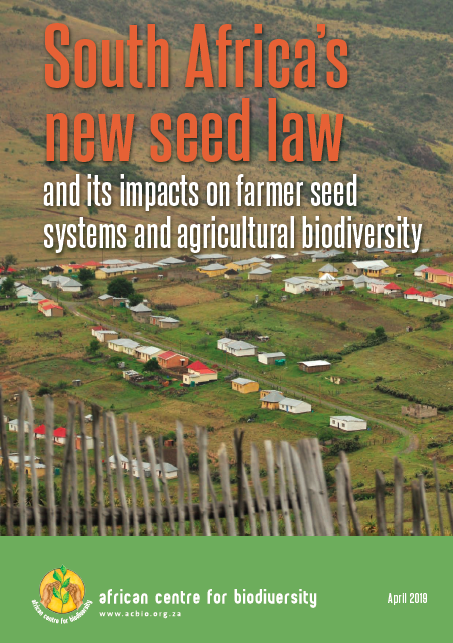Latest Resources

2 August 2019
Transforming the Farm Input Support Programme (FISP) to diversified agroecology practices in Shib...
This is a second briefing paper to come out of farmer exchange events held in Zambia in May. The first exchange took place in Kalulushi District, Copperbelt Province, and you can find that briefing paper here. Then a second exchange was convened in Shibuyunji District, Central Province, where the objective was to continue sharing ideas […]

23 July 2019
Moving from the Farm Input Subsidy Programme (FISP) to Agroecology in the Kalulushi District, Cop...
This briefing highlights key issues raised at a farmer exchange and learning event held in May 2019 in Kalulushi District, in the Copperbelt Province of Zambia. The overall objective of the meeting was to share and exchange ideas on transitioning to a smallholder support system for diversified agroecological farming. Participants discussed the roles that farmers, […]

23 April 2019
South Africa’s new Plant Breeders’ Rights Act and its effect on farmers’ rights and farmer manage...
In this updated briefing, the African Centre for Biodiversity (ACB) warns that the Plant Breeder’s Rights Act (PBR) 2018 will impact negatively on small-scale farmers and calls for exemptions in the Regulations to protect farmers’ rights. The PBR, together with the new Plant Improvement Act (PIA) 2018, was approved by Parliament last October and has […]

23 April 2019
South Africa’s new seed law and its impacts on farmer seed systems and agricultural biodiversity
In this updated briefing, the African Centre for Biodiversity (ACB) reflects on how the new Plant Improvement Act (PIA) 2018 will further undermine the rights of small-scale farmers while expanding the rights of the corporate agricultural sector, further entrenching its domination. The PIA, together with the new Plant Breeder’s Rights Act (PBR) 2018, was approved […]

17 October 2018
UPOV 1991 and the ITPGRFA: Key issues for farmer managed seed systems in South Africa
The South African government has called upon stakeholders to submit comments and attend stakeholder meetings on the 23rd and 24th October 2018, on the implications of South Africa acceding to the International Union for the Protection of New Varieties of Plants (UPOV 1991) and the International Treaty on Plant Genetic Resources for Food and Agriculture […]

4 October 2018
GM0 ALERT: news and status quo in South Africa
As part of the African Centre for Biodiversity (ACB)’s monitoring and resistance of GMO activities in SA, we share with you, our latest GMO Alert. In this alert we highlight the following issues concerning GMOs in South Africa: General release of the Monsanto/Water Efficient Maize for Africa (WEMA) GM drought tolerant maize on hold as […]

17 September 2018
The SADC PVP Protocol: Blueprint for uptake of UPOV 1991 in Africa
In the recently published discussion paper, ‘The SADC PVP Protocol: Blueprint for uptake of UPOV 1991 in Africa’, Sabrina Masinjila and Mariam Mayet, provide an updated critique on the regional Plant Variety Protection (PVP) system developed under the auspices of the Southern African Development Community (SADC) – the SADC PVP protocol – adopted by the […]

1 September 2017
WEMA Project shrouded in secrecy: open letter to African governments to be accountable to farmers...
The Water Efficient Maize for Africa (WEMA) project promises to develop drought tolerance in maize for the benefit of small holder farmers, but is really a project designed to facilitate the spread of hybrid and genetically modified (GM) maize varieties on the continent. WEMA involves five African countries: Kenya, Mozambique, South Africa, Tanzania and Uganda. […]

10 August 2017
The Water Efficient Maize for Africa Project: Profiteering not Philanthropy
This scoping study aims to appraise, to the best of our knowledge, the current status of the roll-out of a public- private partnership which forms the the Water Efficient Maize for Africa (WEMA) project in five African countries: Kenya, Mozambique, South Africa, Tanzania and Uganda. The partnership is between the African Agricultural Technology Foundation (AATF), […]

31 July 2017
No Safe Limits for Toxic Pesticides in Our Foods
On 7 April 7 2017 the South African government issued draft amendments to its regulations governing the legal limits for pesticide residues on food crops. The proposed amendments expose the gaps in regulations to date, despite the cultivation of herbicide-tolerant GM crops for almost two decades. As the African Centre for Biodiversity (ACB) team researched […]
